- Home
- Ernest Hemingway
Islands in the Stream Page 34
Islands in the Stream Read online
Page 34
He stopped and reconsidered, “No, I’m sorry. I was wrong. Fill water until sundown and I will take her out at moonrise. We lose three hours but we save six later on.”
“Did you taste the water?” Ara asked.
“Yes,” he said. “It was clean and good. You were quite right.”
“Thank you,” Ara said. “I will go now to call in Willie. He has been diving many.”
“Tom,” Henry asked. “Do you want me to stay with you or to carry water or what?”
“Carry water until you are too tired and then get some sleep. I want you on the bridge with me tonight.”
“Can I bring you a shirt or a sweater?” Henry asked.
“Bring me a shirt and one of the very light blankets,” Thomas Hudson said. “I can sleep now in the sun and the sand is dry. But later on it will be cool with the wind.”
“Isn’t the sand wonderful? I’ve never known such dry or powdery sand.”
“The wind has beaten it for many years.”
“Will we get them, Tommy?”
“Of course,” Thomas Hudson said. “There is no doubt of it at all.”
“Please forgive me if I am ever stupid,” Henry said.
“You were forgiven when you were born,” Thomas Hudson said. “You are a very brave boy, Henry, and I am fond of you and trust you. You’re not stupid either.”
“You truly think we will have a fight?”
“I know it. Do not think about that. Think about details. Think about all the things you should do and how we should be a happy ship until we fight. I’ll think about the fight.”
“I will go and do my duty as well as I can,” Henry said. “I wish we could practice the fight so I could do my part better.”
Thomas Hudson said, “You’ll do it all right. I do not see any way that we can miss it.”
“It’s been so very long,” Henry said.
“But everything is long,” Thomas Hudson told him. “And pursuit is the longest.”
“Get some sleep,” Henry said. “You never sleep any more.”
“I’ll sleep,” Thomas Hudson said.
“Where do you suppose they lost their own boat, Tom?” Ara asked.
“They got these boats here and they did away with these people a week ago, say. So they must be the one that Camagüey claimed. But they got somewhere close to here before they lost her. They didn’t sail any rubber boats into that wind.”
“Then they must have lost her east of here.”
“Naturally. And they were damned well in the clear when they lost her,” Thomas Hudson said.
“It was still a long way home,” Henry said.
“It is going to be a longer way home now,” Ara said.
“They’re funny people,” Thomas Hudson said. “They’re all brave and some of them are so damned admirable. Then they have mean ones like this.”
“We better go and do our work,” Ara said. “We can talk tonight on watch to keep awake. You get some rest, Tom.”
“Get some sleep,” Henry said.
“Rest is as good as sleep.”
“No it isn’t,” Ara said. “You need sleep, Tom.”
“I’ll try to get some,” Thomas Hudson said. But when they were gone he could not sleep.
What did they have to do this rotten thing here for? he thought. We will get them anyway. All these people would have done was tell us how many they were and how they were armed. I suppose that was worth killing for, from their standpoint. Especially if they thought of these people as Negroes. But all that shows something about them. To have killed like that they must have some plan and they must have some hope of being picked up. Also there must have been dissension about the plan or they would not have done this murdering here of the sailor. That could be an execution for anything, though. He might have let her go down when she could have been kept up to make the try to get home.
Where does that bring us? he thought. You can’t bank on that. It is only a possibility. But if it was true it would mean she went down in sight of land and fast. That would mean they would not have much stuff. Maybe the boy did not do it and was falsely accused.
You don’t know how many boats they have because there could be a boat or two boats from here out turtling. There is nothing to do but think around it and check your keys.
But suppose they have crossed the Old Bahama channel and hit the Cuban coast? Sure, he thought. Why didn’t you think of that before? That’s the best thing for them to do.
If they do that they can make for home on a Spanish boat out of Havana. There is a screening at Kingston. But that is an easier chance to take and you know plenty of people have beaten it. That damned Peters with his radio out. FCC, he thought. Frankly Can’t Communicate. Then we got the beauty big one and it was too much radio for him. I don’t know how he has fucked it. But he couldn’t get Guantánamo last night on our call hour and if he doesn’t get her tonight we are on our own. The hell with it, he thought. There are worse places to be than on your own. Get some sleep now, he said to himself. There is nothing you can do now that is sounder than that.
He moved his shoulders against the sand and went to sleep with the roaring of the surf on the reef.
III
While Thomas Hudson was asleep he dreamed that his son Tom was not dead and that the other boys were all right and that the war was over. He dreamed that Tom’s mother was sleeping with him and she was sleeping on top of him as she liked to do sometimes. He felt all of this and the tangibility of her legs against his legs and her body against his and her breasts against his chest and her mouth was playing against his mouth. Her hair hung down and lay heavy and silky on his eyes and on his cheeks and he turned his lips away from her searching ones and took the hair in his mouth and held it. Then with one hand he moistened the .357 Magnum and slipped it easily and sound asleep where it should be. Then he lay under her weight with her silken hair over his face like a curtain and moved slowly and rhythmically.
That was when Henry put the light blanket over him and Thomas Hudson said, asleep, “Thank you for being so moist and lovely and for pressing on me so hard. Thank you for coming back so quickly and for not being too thin.”
“The poor son of a bitch,” Henry said and covered him carefully. He went away carrying two wicker five-gallon demijohns on his shoulders.
“I thought you wanted me thin, Tom,” the woman said in the dream. “You said I felt like a young goat when I was thin and that nothing felt better than a young goat.”
“You,” he said. “Who’s going to make love to who?”
“Both of us,” she said. “Unless you want it differently.”
“You make love to me. I’m tired.”
“You’re just lazy. Let me take the pistol off and put it by your leg. The pistol’s in the way of everything.”
“Lay it by the bed,” he said. “And make everything the way it should be.”
Then it was all the way it should be and she said, “Should I be you or you be me?”
“You have first choice.”
“I’ll be you.”
“I can’t be you. But I can try.”
“It’s fun. You try it. Don’t try to save yourself at all. Try to lose everything and take everything too.”
“All right.”
“Are you doing it?”
“Yes,” he said. “It’s wonderful.”
“Do you know now what we have?”
“Yes,” he said. “Yes I know. It’s easy to give up.”
“Will you give up everything? Are you glad I brought back the boys and that I come and be a devil in the night?”
“Yes. I’m glad of everything and will you swing your hair across my face and give me your mouth please and hold me so tight it kills me?”
“Of course. And you’ll do it for me?”
When he woke he touched the blanket and he did not know, for an instant, that it was a dream. Then he lay on his side and felt the pistol holster between his legs and how it was really and
all the hollownesses in him were twice as hollow and there was a new one from the dream. He saw it was still light and he saw the dinghy carrying water to his ship and he saw the white pounding of the surf on the reef. He turned on his side and tucked the blanket around himself and slept on his arms. He was asleep when they came to wake him and he had not dreamed at all this time.
IV
He steered all that night and he had Ara on the flying bridge with him until midnight and then Henry. They were running with a heavy beam sea and steering was like riding a horse downhill, he thought. It is all downhill and sometimes it is across the side of a hill. The sea is many hills and in here it is a broken country like the badlands.
“Talk to me,” he said to Ara.
“What about, Tom?”
“Anything.”
“Peters couldn’t raise Guantánamo again. He has ruined it. The new big one.”
“I know,” Thomas Hudson said and tried to roll her as little as he could, riding the side of the hill. “He’s burnt out something that he can’t repair.”
“He’s listening,” Ara said. “Willie is keeping him awake.”
“Who’s keeping Willie awake?”
“He’s awake good,” Ara said. “He doesn’t sleep any better than you.”
“How about you?”
“I’m good for all night if you want. Don’t you want me to steer?”
“No. I haven’t anything else to do.”
“Tom, how badly do you feel?”
“I don’t know. How badly can you feel?”
“It’s useless,” Ara said. “Would you like the wineskin?”
“No. Bring me up a bottle of cold tea and check on Peters and Willie. Check on everything.”
Ara went down and Thomas Hudson was alone with the night and the sea and he still rode it like a horse going downhill too fast across broken country.
Henry came up with the bottle of cold tea.
“How are we, Tom?” he asked.
“We’re perfect.”
“Peters has the Miami police department on the old radio. All the prowl cars. Willie wants to talk to them. But I told him he couldn’t.”
“Correct.”
“On the UHF, Peters has something squirting in German but he says it is way up with the wolf packs.”
“He couldn’t hear it then.”
“It’s a very funny night, Tom.”
“It’s not that funny.”
“I don’t know. I’m just telling you. Give me the course and let me take her and you go down.”
“Has Peters logged it?”
“Of course.”
“Tell Juan to give me a fix and have Peters log it. When was the son of a bitch squirting?”
“When I came up.”
“Tell Juan to get the fix and log it right away.”
“Yes, Tom.”
“How are all the comic characters?”
“Sleeping. Gil, too.”
“Get the rag out and have Peters log the fix.”
“Do you want it?”
“I know too damn well where we are.”
“Yes, Tom,” Henry said. “Take it easy if you can.”
Henry came up but Thomas Hudson did not feel like talking and Henry stood by him on the flying bridge and braced himself against the roll. After an hour he said, “There’s a light, Tom. Off our starboard bow about twenty degrees.”
“That’s right.”
When he was abeam of it he changed the course and the sea was astern.
“Now she is headed home to pasture,” he said to Henry. “We’re in the channel now. Wake Juan and get him up here and really keep your eyes open. You were late on the light.”
“I’m sorry, Tom. I’ll get Juan. Wouldn’t you like a four-man watch?”
“Not until just before daylight,” Thomas Hudson said. “I’ll give you the word.”
They might have cut across the banks, Thomas Hudson was thinking. But I don’t think they would. They wouldn’t want to cross at night and in daytime the banks wouldn’t look good to deep-water sailors. They’d make their turn where I did. Then they would edge across comfortably the way we are going to do and they would probably hit for the highest part of the Cuban coast that showed. They don’t want to get into any port so they will run with the wind. They will keep outside of Confites because they know there is a radio station there. But they have to get food and they have to get water. Actually they would do best to try to get as close to Havana as they could to land somewhere around Bacuranao and then infiltrate in from there. I’ll send a signal from Confites. I won’t ask him what to do. That will hold us up if he’s away. I’ll tell him what it is and what I’m doing. He can make his own dispositions. Guantánamo can make theirs and Camagüey can make theirs and La Fe theirs and the FBI theirs and maybe something will happen in a week.
Hell, he thought. I’ll get them this week. They’ve got to stop for water and to cook what they have before the animals starve and rot. There’s a good chance they will run only at nights and lay up daytimes. That would be logical. That’s what I would do if I were them. Try to think like an intelligent German sailor with the problems this undersea boat commander has.
He has problems all right, Thomas Hudson thought. And the worst problem he has is us and he doesn’t even know about us. We don’t look dangerous to him. We look good to him.
Don’t take it in any bloodthirsty way, he thought. Nothing of this is going to bring back anything. Use your head and be glad to have something to do and good people to do it with.
“Juan,” he said. “What do you see, boy?”
“All bloody ocean.”
“You other gentlemen see anything?”
“Bloody nothing,” Gil said.
“My bloody belly sees coffee. But it doesn’t come any closer,” Ara said.
“I see land,” Henry said. He had seen it that instant, a low square smudge as though a man’s thumb had daubed weak ink against the lightening sky.
“That’s behind Romano,” Thomas Hudson said. “Thank you, Henry. Now you characters go down for coffee and send up four other desperate men to see strange and amusing things.”
“Do you want coffee, Tom?” Ara asked.
“No. I’ll take tea when it’s made.”
“We’ve only been on watch a couple of hours,” Gil said. “We don’t need to go off, Tom.”
“Go on down and get coffee and give the other desperate men a chance for glory.”
“Tom, didn’t you say you thought they were at Lobos?”
“Yes. But I changed my mind.”
The others had gone down and four were coming up.
“Gentlemen,” Thomas Hudson said. “Split the four quadrants up amongst you. Is there coffee below?”
“Plenty,” his mate said. “And tea. The engines are good and she didn’t make any more water than you would expect in the cross sea.”
“How is Peters?”
“He drank his own whisky in the night. The one with the little lamb on it. But he stayed awake. Willie kept him awake and drank his whisky,” his mate said.
“We have to fill gas at Confites and take on anything else there is.”
“They can load fast and I can kill a pig and scald and scrape him,” his mate said. “I’ll give them a quarter at the radio station to help me and I can butcher him while you are running. You get some sleep while we load. Would you like me to steer?”
“No. I only have to send three signals at Confites and you load and I will sleep. Then we will pursue.”
“Toward home?”
“Of course. They may avoid us for a time. But they cannot escape us. Later we will talk about it. How are they?”
“You know them. We will talk about it later. Steer in a little more, Tom. With the countercurrent you’ll shorten it.”
“Did you lose much with rolling?”
“Nothing that matters. It was a bitch of a beam sea,” his mate said.
“Ya lo creo,” said Thom
as Hudson. “I believe it.”
“There should only be the people of this one undersea boat around here. She must surely be the one they claimed sunk. Now they are off La Guayra and above Kingston and on all the petrol lanes. Also they are with the wolf packs.”
“Also they are here sometimes.”
“Yes, for our sins.”
“And for theirs.”
“On this thing we will pursue well and intelligently.”
“Let us get it started,” Thomas Hudson said.
“There has been no delay.”
“It goes slowly for me.”
“Yes,” his mate said. “But get some sleep in Confites and I promise everything will go faster than you could hope.”
V
Thomas Hudson saw the high lookout post on the sandy key and the tall signalling mast. They were painted white and were the first things that showed. Then he saw the stumpy radio masts and the high cocked wreck of the ship that lay on the rocks and obscured the view of the radio shack. The key was not handsome from his side.
The sun was behind him and it was easy to find the first big pass through the reef and then, skirting the shoals and the coral heads, to come up on the leeward shelter. There was a sandy half-moon of beach and the island was covered with dry grass on this side and was rocky and flat on its windward end. The water was clear and green over the sand and Thomas Hudson came in close to the center of the beach and anchored with his bow almost against the shore. The sun was up and the Cuban flag was flying over the radio shack and the outbuildings. The signalling mast was bare in the wind. There was no one in sight and the Cuban flag, new and brightly clean, was snapping in the wind.
“Maybe they had a relief,” Thomas Hudson said. “The old flag was pretty worn when we left.”
He looked and saw his drums of gas where he had left them and the marks of digging in the sand where his blocks of ice should be buried. The sand was high like new-made graves and over the island sooty terns were flying in the wind. They nested in the rocks up at the windward end and a few nested in the grass of the lee. They were flying now, falling off with the wind, cutting sharply into it, and dipping down toward the grass and the rocks. They were all calling, sadly and desperately.

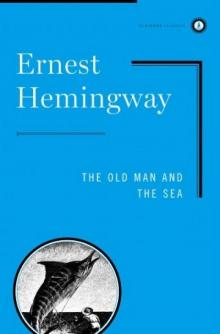 The Old Man and the Sea
The Old Man and the Sea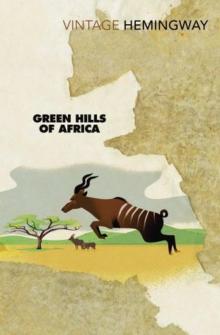 Green Hills of Africa
Green Hills of Africa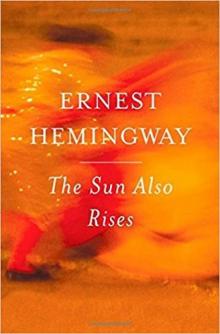 The Sun Also Rises
The Sun Also Rises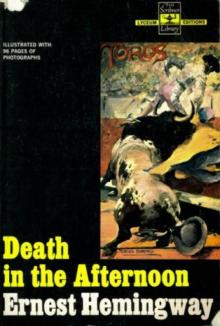 Death in the Afternoon
Death in the Afternoon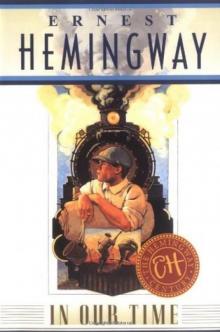 In Our Time
In Our Time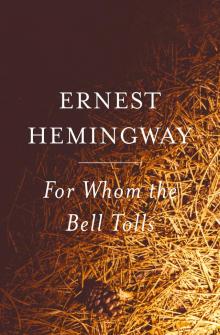 For Whom the Bell Tolls
For Whom the Bell Tolls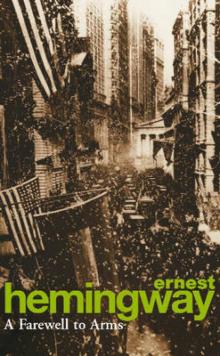 A Farewell to Arms
A Farewell to Arms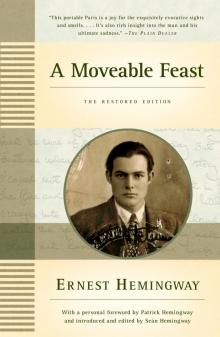 A Moveable Feast
A Moveable Feast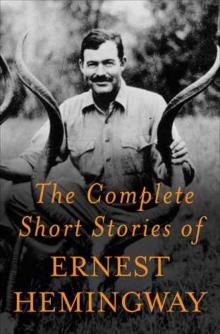 The Complete Short Stories of Ernest Hemingway
The Complete Short Stories of Ernest Hemingway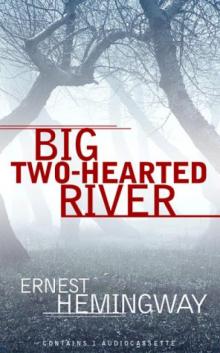 Big Two-Hearted River
Big Two-Hearted River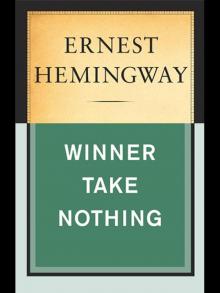 Winner Take Nothing
Winner Take Nothing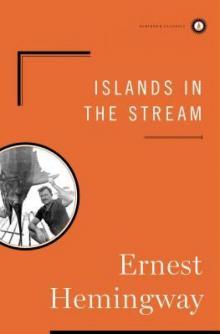 Islands in the Stream
Islands in the Stream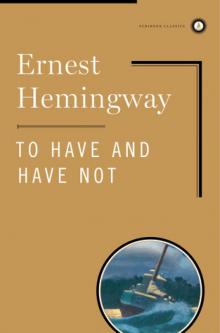 To Have and Have Not
To Have and Have Not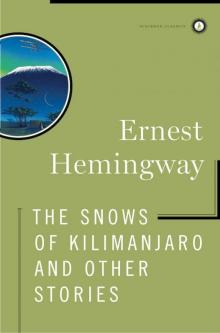 The Snows of Kilimanjaro and Other Stories
The Snows of Kilimanjaro and Other Stories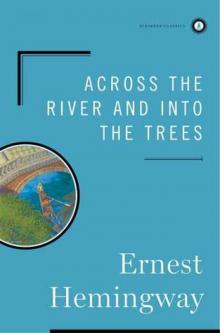 Across the River and Into the Trees
Across the River and Into the Trees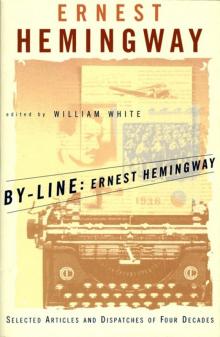 By-Line Ernest Hemingway
By-Line Ernest Hemingway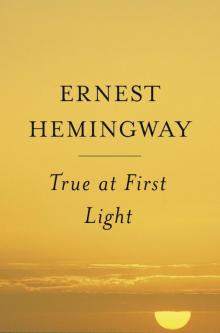 True at First Light
True at First Light Men Without Women
Men Without Women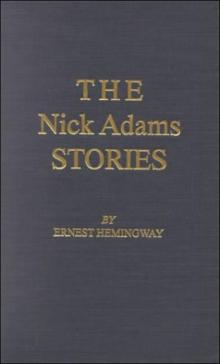 The Nick Adams Stories
The Nick Adams Stories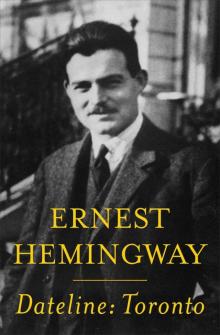 Dateline- Toronto
Dateline- Toronto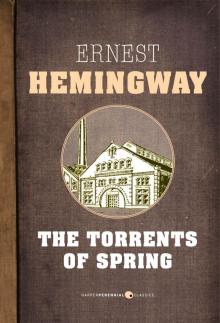 The Torrents of Spring
The Torrents of Spring Short Stories
Short Stories